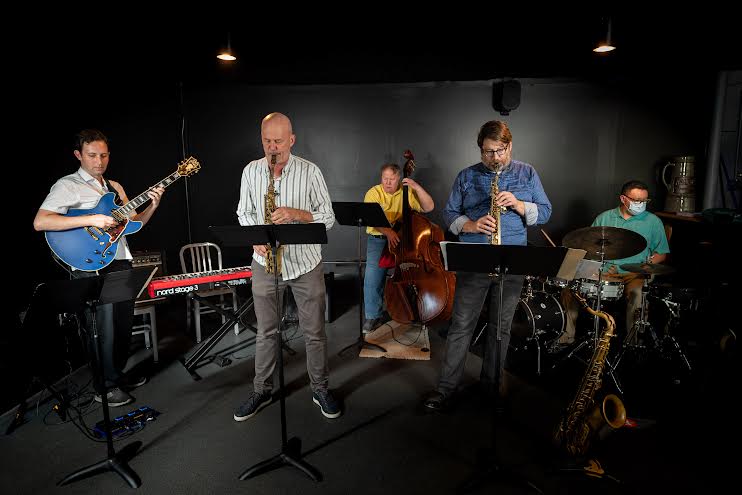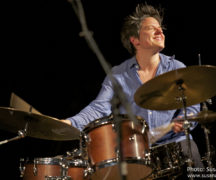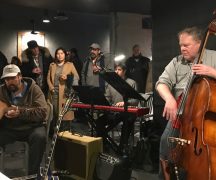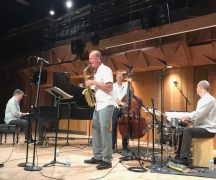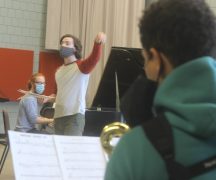By DAVID DUPONT
BG Independent News
When jazz guitarist Ariel Kasler moved to the United States he brought memories of traditional Jewish and Israeli folk music with him. Not that he had been interested in those sounds back home in Galilee, he said in a recent interview.
He listened to a diverse range of music including Soundgarden, J.S. Bach and John Coltrane and classical music.
“I was not very attracted to Jewish music or Israeli music,” he said. Still “those sounds were around me.”
He heard them at friends’ houses and on the radio, and a major klezmer festival was held 10 minutes away. “I was exposed to it.”
“After I left Israel, I started finding more appeal in all those sounds that could make my music more interesting and unique,” he said.
That influence is comes through on his newest recording “Make It Bloom,” which will be released on Bandcamp Feb. 16. The recording features David Bixler, alto saxophone, Andrew Bishop, tenor and soprano saxophone, Kasler, guitar and piano, Jeff Halsey, bass, and Olman Piedra, drums.
The quintet has a run of shows to promote the album. Those include concert as part of the Faculty Artist Series at BGSU on the day of the release at 8 p.m. in Bryan Recital Hall. The next night, Feb. 17, Lucille’s Jazz Lounge, at 7 p.m., and the Bop Shop in Cleveland, Feb. 18 at 7 p.m.
He’s also hoping to reschedule a snowed-out show at Arlyn’s Good Beer.
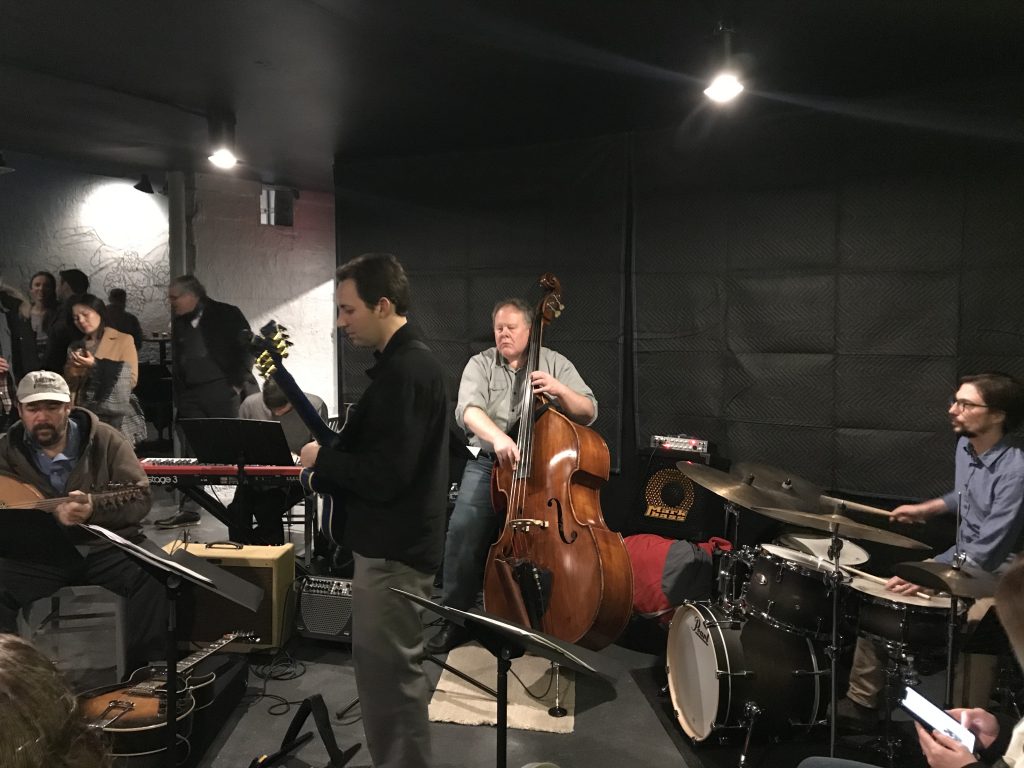
“Make It Bloom” is his second recording. His first, from 2015, featured the same ensemble. That also featured a Middle-Eastern tinge to it.
On “Make It Bloom,” Kasler ties together the session with four renditions of “Shmama,” an original that sounds like it could be traditional Hebrew tune. “Shmama” is a Hebrew word meaning a desolate or empty place, Kasler explained, “roughly translating to ‘middle of nowhere.’”
The melody contains a sense of heartache. In the past he’s treated it in typical jazz fashion – playing the melody at the beginning, followed by a series of solos. “I wasn’t completely satisfied with the result, which tended to be to drawn out.”
Instead he has himself on both piano and guitar, Bishop on clarinet, and Bixler on alto saxophone, interpret it freely in turn. “The piece creates a specific mood … that I wanted to return to, tying the album together.”
Other pieces are based on jazz standards, he said. The song “Stella by Starlight” becomes “Yalla Stella.” “Joe Henderson’s “Inner Urge” comes out as “Emerge.” And “Darn That Dream” is “Just a Dream.”
Instead of the usual practice of simply writing a new melody over the chord structure of a tune, he said, “I changed the harmony, changed the form. They’re pretty remote from their origins, but there’s still some connection to something familiar.”
Still, he said, “most of them you wouldn’t recognize. Even the musicians don’t know the connection until I tell them.”
Kasler comes up with the compositions in various ways. “Some of them came with no effort at all,” he said. “Either I hear a melody in my head or I’m improvising on the instrument and find something I liked.”
Others have a longer gestation. “Some of them took a lot more effort to get them to be a composition.”
The opening track of the session, “Elf,” dates back to Kasler’s days as an undergraduate at Berklee College of Music. He had a first part that he liked, but couldn’t figure out how to develop it further. “It wasn’t quite ready until I was ready to record the album.”
Though written on the guitar, he found he preferred to play it on the piano.
He splits his time about equally between piano and guitar on the session.
His musical education in Israel was shaped by the teachers available. He started studying classical piano at 6, and then at 13 started playing jazz guitar. His school offered a plethora of music groups, including jazz band, chamber music, and percussion ensemble.
In 2001, Kasler moved to Boston to attend Berklee. The noted music school has ties to Israel, as well as attracting students from around the world. Kasler said while there he had a quintet with an Argentinian rhythm section, a Portuguese trumpet player and an American saxophonist.
At Berklee he studied jazz guitar, including with noted guitarist Mick Goodrich. After graduating he played on cruise ships for a while before moving to Toronto where he freelanced. He did jazz gigs, worked as a collaborative pianist, played in wedding bands, and taught guitar.
He picked up piano again as a freelancer. “I found out there was a lot of work for pianists even though I wasn’t that experienced.”
He started playing jazz and pop style on the keyboard, drawing on his knowledge from classical lessons and jazz guitar.
After freelancing for a few years both he and his wife, classical saxophonist Bobbi Thompson, decided they wanted to pursue more education to improve their employment prospects.
A former student of Thompson’s attended graduate school at BGSU, so the couple came here first to hear the student’s recital.
That’s when Kasler first met Chris Buzzelli, the professor of guitar at the time, and became acquainted with the university’s jazz program.
Both he and Thompson decided to enroll. She earned a performance certificate and he pursued a master’s degree in jazz studies. When he graduated in 2014 he returned to Canada, only to return the next year when Buzzelli retired.
Kasler, 40, taught as an adjunct before being appointed an assistant teaching professor.
Studying and now teaching at BGSU offers a different and complementary experience from what he had at Berklee.
“Berklee was huge,” he said. “I didn’t really get to know the faculty that well and didn’t really have that many opportunities with the guest artists other than seeing them perform. Here in a small jazz program I really got to interact closely with the faculty and the guest artists.”
That extends to his students. They benefit from a number of guests artists visiting throughout the year. That includes, just this spring, Blues Brothers’ saxophonist Lou Marini and New York session player Jaleel Shaw.
“There’s a kind of support here that a lot of schools can’t offer,” he said
BGSU also offers the opportunity to explore a variety of styles, and that’s important for anyone pursuing a career in music.
“Music is a career that can lead you in a lot of different directions,” Kasler said. “It’s not the easiest career, but it’s definitely still possible for people if that is what they really want to do. … For most of us we have to be willing to be flexible, to teach and play different styles of music. Mostly, people who work really hard and get very good and are professional and can be relied on can work in this field. Everybody I’ve seen in Bowling Green who has worked hard has improved and done well.”
When he was a student he had the opportunity to fill in for his jazz piano teacher the late Tad Weed in the I-75 Ensemble. With Kasler now on guitar and piano, that’s the same group of musicians he fronts as his own quintet, and the one that recorded “Make It Bloom.”
Kasler looks forward to working with the quintet to get his music out to the public.
“I have the comfort of being based at the university, so I don’t have to compromise in terms of the music or worry about it, in terms of paying the bills,” he said. “I can write the music I want to write and hope people enjoy it and try to get as many people as possible to hear it.”

